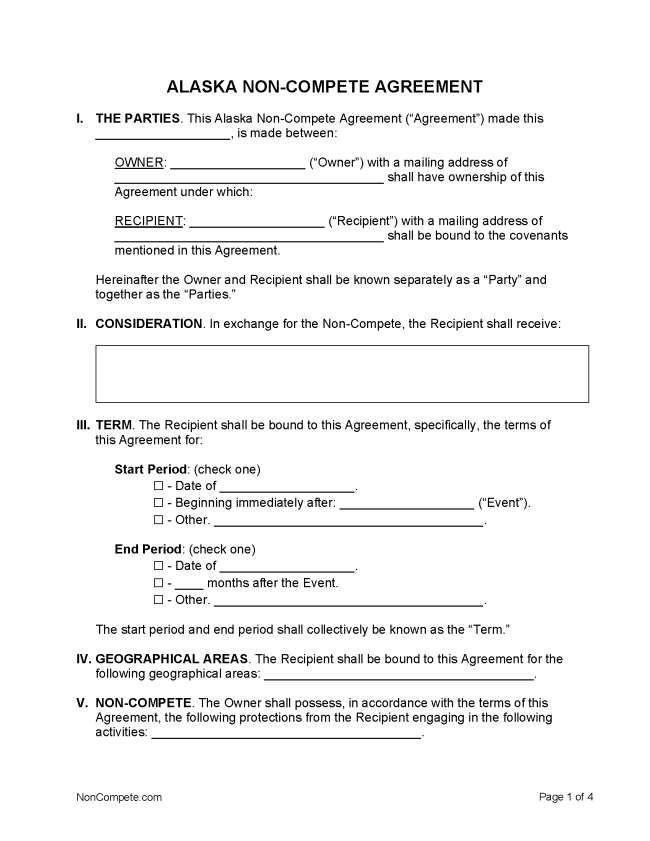An Alaska non-compete agreement restrains a person’s ability to work in the same business for a duration and geographic area. It is common as part of an employment contract or in the sale of a business. A non-compete protects a business from unfair competition from those with sufficient knowledge of their trade secrets and customer information.
Table of Contents |
Are Non-Competes Enforceable in Alaska?
Yes, non-competes in Alaska are “disfavored in the law as restraints upon trade” but are widely accepted as ancillary to an employment agreement or the sale of a business. (Dominic Wenzell, Dmdpc v. Ingrim (2010))
Reasonableness (employment)
A non-compete must be reasonable, with reasonableness for an employee determined under the following conditions:
- Time and space. The absence or presence of limitations as to time and space;
- Sole contact. Whether the employee represents the sole contact with the customer;
- Confidential information. Whether the employee possesses confidential information or trade secrets;
- Eliminating competition. Whether the covenant seeks to eliminate competition that would be unfair to the employer or merely seeks to eliminate ordinary competition;
- Employee hardship. Whether the covenant seeks to stifle the inherent skill and experience of the employee;
- Employee’s detriment. Whether the benefit to the employer is disproportional to the detriment to the employee;
- Employee’s sole means of support. Whether the covenant operates as a bar to the employee’s sole means of support;
- Employee’s talent. whether the employee’s talent which the employer seeks to suppress was developed during the period of employment; and
- Incidental. Whether the forbidden employment is merely incidental to the primary employment.”
Case: Data Management, Inc. v. Greene (1988)
Reasonableness (sale of a business)
For the sale of a business, a non-compete must be reasonable in accordance that:
- The restriction bargained for is no greater than is needed to protect the goodwill of the business; and
- The buyer’s need to protect its goodwill outweighs the hardship to the seller and injury to the public.
Case: Dominic Wenzell, Dmdpc v. Ingrim (2010)
Attorneys (prohibited)
An attorney may not enter into an agreement that prohibits their ability to practice law in the State. (Rule 5.6. Restrictions on Right to Practice)
Terminating an Employee
If an employer terminates an employee, it has not been determined by an Alaskan court if a non-compete remains valid.
Burden of Proof
If a case is brought to an Alaska court, the burden of proof is brought upon the party seeking relief (employer). It is up to them to provide the necessary evidence that a non-compete was drafted in good faith. (Data Management, Inc. v. Greene (1988))
Continued Employment (consideration)
Consideration is required for a contract, not for the sale of goods (Holiday Inns of America, Inc. v. Peck (1974)). However, the State of Alaska has not ruled if continued employment is determined to be sufficient consideration.
Maximum Term
A maximum term of 5 years was determined to be reasonable for employment and the sale of a business. (Data Management, Inc. v. Greene (1988), Dominic Wenzell, Dmdpc v. Ingrim (2010))
Blue Penciling (allowed)
An Alaskan court, if it deems an agreement was drafted in good faith, can “alter the covenant not to compete to render it enforceable.” (Data Management, Inc. v. Greene (1988))
